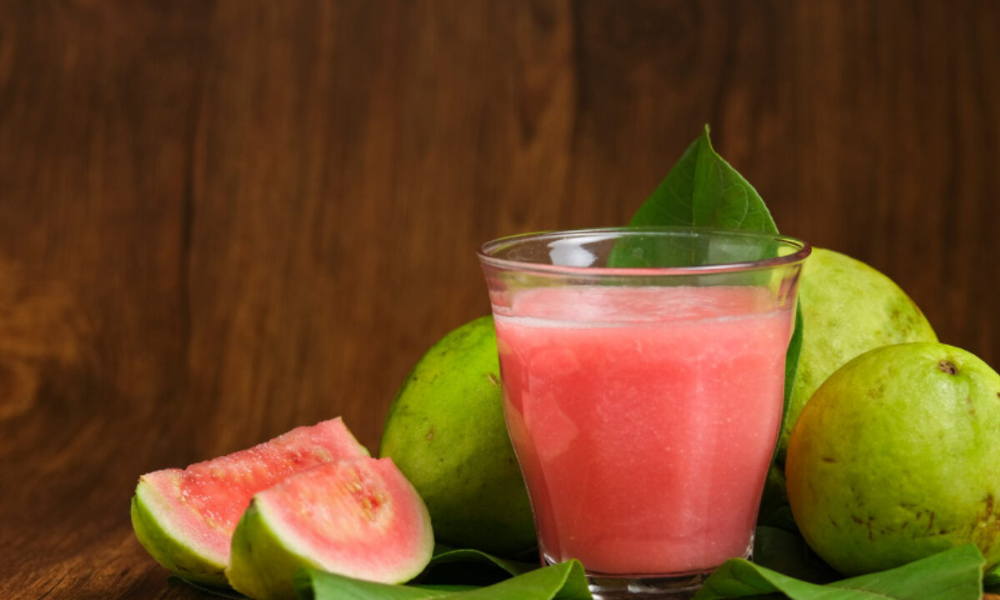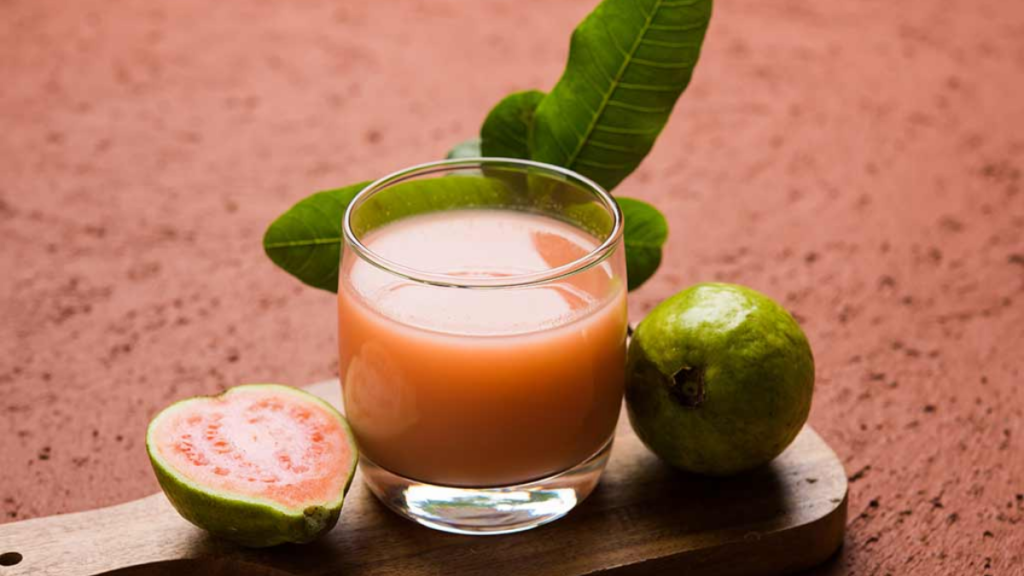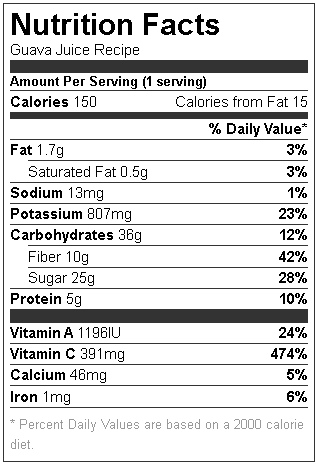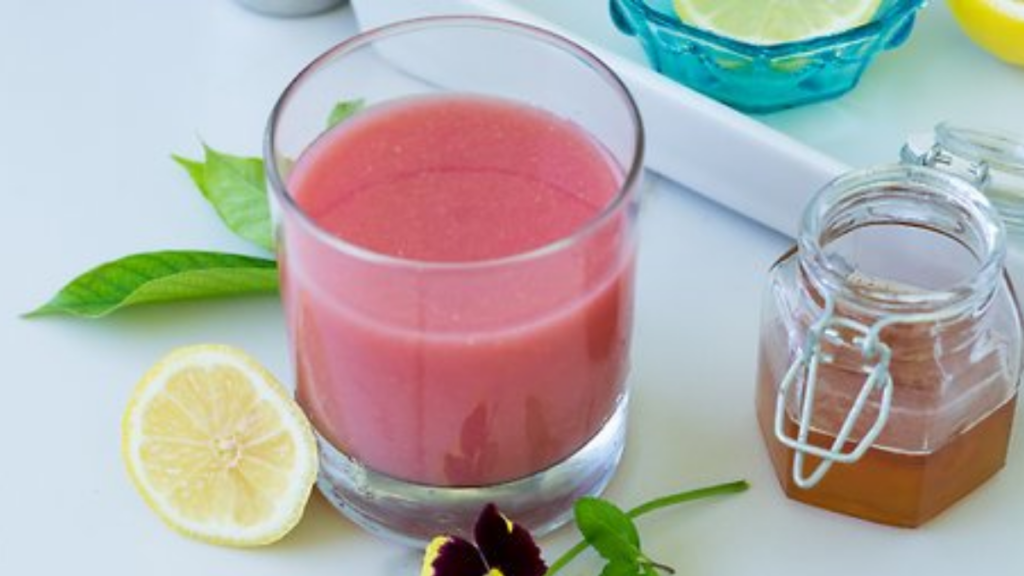Guava is a popular tropical fruit used in various products such as juices, jams, rums, jellies, and more. It’s now grown in a variety of tropical and subtropical climates. Guava has a nutritional composition that is even more vitamin C-rich than oranges and more potassium-rich than bananas. It is commonly referred to as “the poor man’s apple” because of its low cost. With this guava juice recipe, making a homemade delicious tropical fruit juice is as easy as pie. There’s no need to be concerned about guava juice, a drink that smells like guava but contains artificial colors and sugars.
There’s nothing like freshly squeezed juice. Making your juice offers nutrition as well as taste. Guavas are very high in nutrients. Guavas are high in potassium and soluble fiber, beneficial to your heart. They are also high in vitamin C. One guava has twice the vitamin C content of an orange.
Nutrition Facts Guava Juice
How to Make Guava Juice?
Juicing guava at home brings a ton of benefits. Plus, it’s only four simple steps, as shown below.
Ingredients
- 24 guavas rinsed
- 1 cup water
- 2 tsp lemon juice
- 1 tbsp sugar
- 2 tbsp mint leaves
- 2 cups ice cubes
- 6 oz green grapes rin
Instructions
- Run 24 oz guavas, 6 oz green grapes, and 2 tbsp mint leave through a juicer.
- Add 2 tsp lemon juice, 1 tbsp sugar, and 1 cup water to the guava juice.
- Stir to combine.
- Put 2 cups of ice cubes into serving glasses. Pour the guava juice over, and garnish with mint leaves and a small slice of guava (optional). Enjoy it chilled.
What Fruits Can Go With Guava Juice?
In juices, guava is a fairly forgiving fruit. Apples, bananas, kiwi, mango, orange, pineapple, plum, strawberries, and coconuts are among the tropical and acidic fruits that go well with it. Guava juice tastes best when cooled and poured over ice cubes. To help spice things up, consider adding ginger, honey, or a touch of cinnamon.
Strawberries-Strawberries are famous all across the world, and they are adaptable and can be used in various sweet and savory meals. In addition to essential handmade juices, Strawberry and guava can be used to compliment a little bourbon. Feel free to experiment with brandy, champagne, rum, and sake!
Pineapple-When pineapple and guava are mixed, they produce a truly tropical flavor explosion. They combine to give a sweet, tangy, and refreshing flavor. A pineapple-infused rum or a pia colada can be transformed into an ombre guava cocktail. Consider making a mouthwatering welcome cocktail with mint leaves and kosher salt for summer events!
What Are the Benefits of Guava Juice?
Guava juice is well-known for its health-promoting properties, and this fruit juice merits a round of praise for being an energy booster and maintaining blood pressure and weight loss. Let’s look at some of the essential guava juice advantages.
Antioxidant Properties
Guava contains a significant amount of lycopene. Antioxidants aid in the battle against free radicals in the body, protecting DNA from damage. Its regular consumption inhibits cell development and degeneration.
Weight Loss Management
Guava juice is perfect for anyone who wants to lose weight and get in shape without sacrificing their protein, vitamin, or fiber intake. When you choose the juice, you get a full liquid that helps you lose weight by reducing cravings between meals. However, before starting a weight-loss program with this drink, you should visit a dietitian. Because the juice of this fruit can be rather sweet, if not appropriately ingested, it can lead to weight gain.
Easy Digestion
The digestive tract requires a sufficient amount of fiber to function correctly. Most digestive difficulties are caused by a lack of roughage in the diet, which is also the source of many health disorders. The astringent in this juice cleanses the stomach lining and inhibits infection-causing bacteria from multiplying. This juice’s antioxidants and vitamin C aid in removing pollutants from the system, allowing you to maintain good digestive health.
Improves Heart Health
A result of high blood pressure is hypertension which is caused due to a high level of sodium intake and a low amount of potassium in the body. Including guava juice helps you maintain an equal balance of sodium and potassium in your body. Guava juice also benefits the heart by keeping its cholesterol levels low, ensuring a smooth flow of blood circulation.
Diabetes Management
Guava has a low glycemic index, making it an excellent fruit for people with diabetes to consume. It has a lot of dietary fiber, which helps reduce blood sugar levels and treat type 2 diabetes. Diabetes patients are more likely to experience nerve or cardiac damage due to fluctuating blood sugar levels.
The presence of antioxidants in this juice also aids in potassium balance, necessary for heart health. Guava juice is an excellent source of vitamins to energize you during the hot summer months, and it is a good source of vitamins that keep you hydrated. Guava is suitable for your digestive system since it contains a lot of fiber and functions as a natural laxative.
How Long Does Guava Juice Last?
Guava juice can be stored in the refrigerator for up to a week, and if the pulp is removed before juicing, this can be extended. Apart from how it’s stored, enzymes and bacteria are the two most essential elements in determining how fresh something is. Therefore, what else is added to the juice can make a significant difference. Most bacteria are neutrophils, meaning they thrive in a neutral pH environment. (around 7). As a result, juices containing high-acid fruits (pH of 4.6 or less) are the least likely to deteriorate.
Types of Guava
Guava has a low acidity level and is high in antioxidants. Although red guava is used in today’s dish, there aren’t many significant changes in texture and flavor among the other types.
Whichever guava variety you choose, make sure to buy ripe fruits with soft flesh so that they generate more juice when juicing.
Red Guava (or Pink Guava)
In Florida, particularly Miami, red guava is a popular tropical fruit, often known as pink. This type has big or pear-shaped fruits with pink flesh and smooth, delicious yellow skin that you may be familiar with. There are dozens of tiny edible seeds in the crimson guava flesh. When completely ripe, these fruits can provide luscious pulp with a lovely sweet smell.
Before they’re selected, their flesh matures from light pink to a deep red color, and their skin transforms from dark green to light green, then yellow. The distinctive pink tint of red guavas is attributed to carotenoid, an organic pigment found in the fruit. When young, the aromatic skin of the red guava is tough, but as the fruit ripens, both the skin and the pulp soften. Jams, marmalades, and flavorings made from their juicy pulp are delicious.
Yellow Guava (or White Guava)
Yellow guava, sometimes known as white guava, is most common in California and Mexico, earning it Mexican white guava. Yellow guava, unlike red guava, lacks enough pigment to change the color of its flesh, and therefore it remains yellowy white, as the name suggests. Yellow guava has a tannic-tasting peel and is mildly sweet, and it has an extra note of tartness and acidity due to its higher vitamin C content.
While the red type is preferred for fruity drinks and products, yellow guava is more commonly utilized as a complementing element. If you’re looking for something different than guava juice, pear juice is a good alternative. It has the same freshness and tropical flavor as guava juice, but it’s a little sweeter. We also have a recipe for soursop juice, an attractive, nutrient-dense drink to help you get through the day.
Conclusion
You can’t go wrong with guava juice in your diet because it has many health benefits. Just keep in mind that moderation is the key. To improve your culinary talents, try combining guava juice with other tropical fruit juices like passion fruit, pineapple, apple, or kiwi. Freshly squeezed juices are preferable to pre-packaged juices with added sugars and preservatives. Guava is a fruit that is packed with vitamins and minerals. Vitamin A, C, and E, magnesium, fiber, potassium, manganese, phosphorus, and antioxidants are all abundant in this fruit. Guava juice is high in vitamin C and helps to keep your body moisturized.
It offers numerous health benefits, including aiding digestion. Because commercial versions of this juice are frequently laced with artificial flavors and sweeteners, it is always preferable to create your own. To create guava juice at home, cut the guavas into small pieces and combine them with some sugar and water in a blender. Strain the juice and serve with ice cubes and mint leaves as a garnish.



